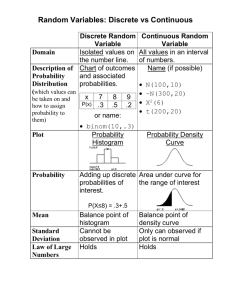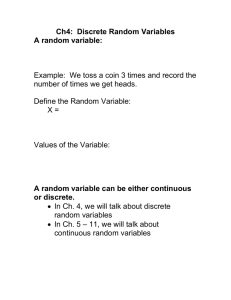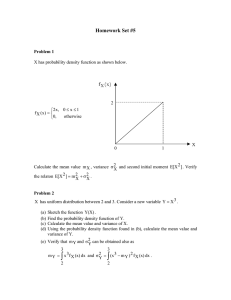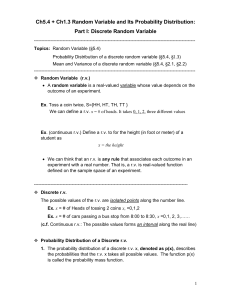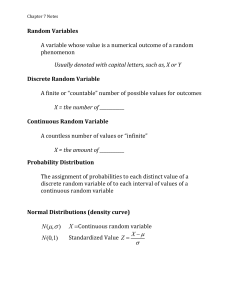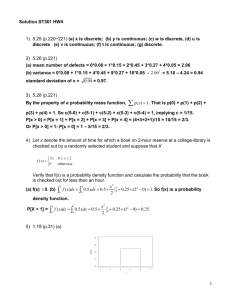Lecture Note 8
advertisement
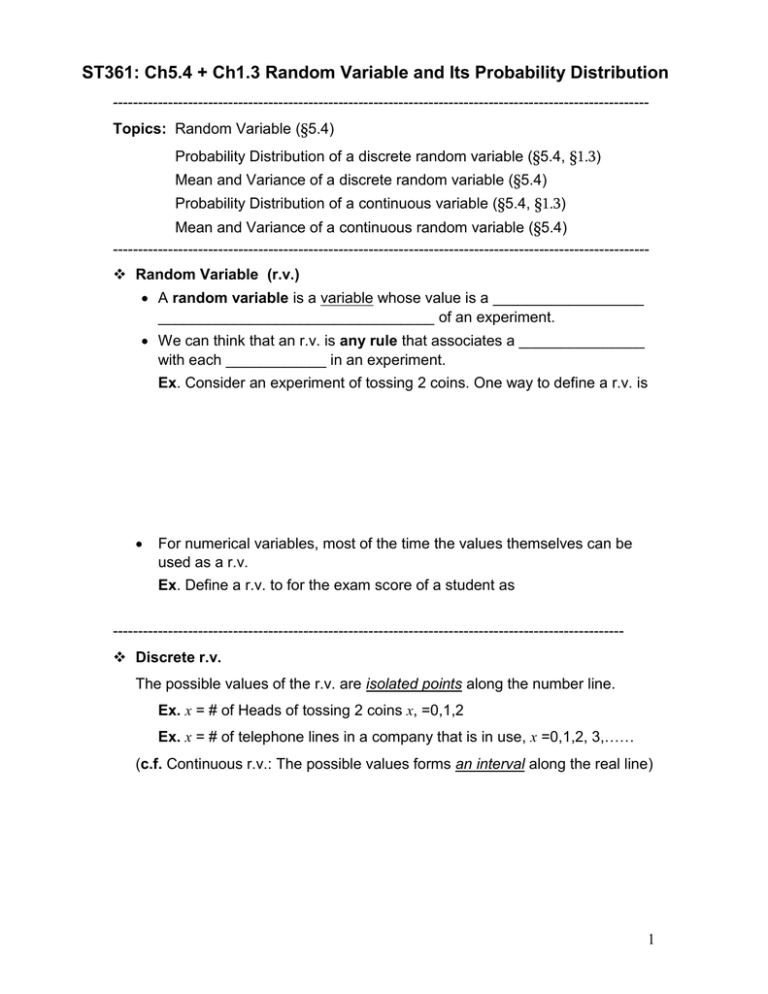
ST361: Ch5.4 + Ch1.3 Random Variable and Its Probability Distribution ----------------------------------------------------------------------------------------------------------Topics: Random Variable (§5.4) Probability Distribution of a discrete random variable (§5.4, §1.3) Mean and Variance of a discrete random variable (§5.4) Probability Distribution of a continuous variable (§5.4, §1.3) Mean and Variance of a continuous random variable (§5.4) ---------------------------------------------------------------------------------------------------------- Random Variable (r.v.) A random variable is a variable whose value is a __________________ _________________________________ of an experiment. We can think that an r.v. is any rule that associates a _______________ with each ____________ in an experiment. Ex. Consider an experiment of tossing 2 coins. One way to define a r.v. is For numerical variables, most of the time the values themselves can be used as a r.v. Ex. Define a r.v. to for the exam score of a student as ----------------------------------------------------------------------------------------------------- Discrete r.v. The possible values of the r.v. are isolated points along the number line. Ex. x = # of Heads of tossing 2 coins x, =0,1,2 Ex. x = # of telephone lines in a company that is in use, x =0,1,2, 3,…… (c.f. Continuous r.v.: The possible values forms an interval along the real line) 1 Probability Distribution of a Discrete r.v. 1. The probability distribution of a r.v., denoted as _________, describes (a) ________________________________________________ and (b) _________________________________________________ Ex. X = result of tossing a fair dice. The probability distribution of x is 2. In general, the probability that x gets a value c, P(x=c), is defined as the sum of all corresponding outcomes in S (i.e., the sample space) that are assigned to the value x. Ex. X = # of heads in tossing two fair coins. Then the probability distribution of X is 3. There are 3 ways to display a probability distribution for a discrete r.v.: Ex. Toss a (unfair) coin 3 times, and let x= # of heads. Then the probability distribution of x is given as below: (1) Density plot 2 (2) Table x P(x) 0 0.1 1 0.4 2 0.3 3 0.2 (3) Formula From the probability distribution, we can calculate P( x = 3 ) = P( x < 2 ) = P( x 2 ) = P( x > 0 ) = 4. For any probability distribution P(x), (recall the axiom of probabilities…) (1) (2) Ex. (1) Find the value of c so that the following function is a probability distribution of a r.v. x: P x c x 2 , where x 0,1,2,3 (2) For this probability distribution, find P(x 2) 3 FYI: Mean and Variance of a discrete r.v. with probability distribution P x The mean x x P x x (The mean of a r.v. is also called as expected value.) The variances x2 x x P x 2 x The standard deviation = Ex. A contractor is required by a county planning department to submit from 1 to 5 different forms, depending on the nature of the project. Let x = # of forms required of the next contractor, and px kx for x=1,2,3,4,5. (a) What is the value of k? (b) What is the probability that at most 3 forms are required? (c) What is the expected number (i.e., mean) of forms required? (d) What is the SD of the number of forms required? (This calculation won’t be included in the exams) 4 Continuous Random Variable (r.v.) A r.v. is continuous if its possible values forms an interval along the real line Ex. x = exam score, 0 x 100 Ex. x = your height, 0 x Probability Distribution of a continuous r.v. 1. Every continuous r.v. x has a __________________________, denoted as ________ such that for any 2 numbers a and b (a<b), P( a x b ) = ________ under the density curve of f(x) between a and b Ex. P( -1 X 1 ) = Ex. P( X 1 ) = Comment: For continuous r.v. x, (1) Probability is the area encompassed by the density curve, the two vertical bars and the x-axis. _______________________________ ______________________________________________________ (2) Because area under the curve represents probabilities, the total area under the density curve should be equal to __________ 5 (3) Unlike the discrete r.v., the Y-axis is not probability ( The height is determined so that ________________ __________________________________________ Ex. ? (4) P( X = a ) = _________ (Think what is the size of the corresponding area?) (5) For a continuous r.v., (6) Ways to presenting the density function of a continuous r.v.: by a density plot or formula (see next page) 6 Ex. Consider a r.v. X= test score. The probability distribution of X is given below. 1) Density plot 2) Density function if x 40 ________ 1 1 y if 30 1200 2 if f x 120 3 if 120 if x 100 ______ P( X=70) = P( 60 < X < 80 ) = P(X > 70 ) = P( X 70 ) = 7 Ex. P X 20 P X 20 P5 X 15 Summary: A density function f x of a r.v. has to satisfied the following properties: (a) f x 0 THINK: do we need 0 f x 1 ? (b) The total area under the curve is 1, i.e., f x dx 1 Why? FYI: Mean and Variance of a continuous r.v. with density function f x The mean x x f x dx (The mean of a r.v. is also called as expected value.) The variances 2 x x The standard deviation 2 f x dx x x 2 f x dx 8
